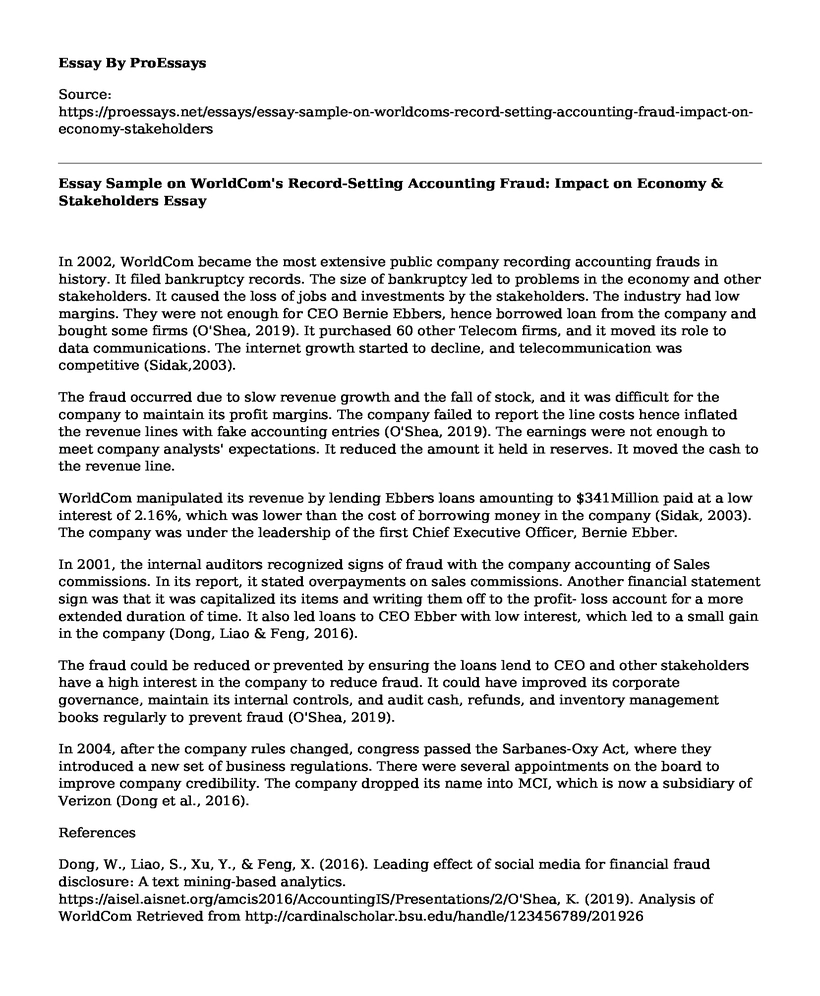In 2002, WorldCom became the most extensive public company recording accounting frauds in history. It filed bankruptcy records. The size of bankruptcy led to problems in the economy and other stakeholders. It caused the loss of jobs and investments by the stakeholders. The industry had low margins. They were not enough for CEO Bernie Ebbers, hence borrowed loan from the company and bought some firms (O'Shea, 2019). It purchased 60 other Telecom firms, and it moved its role to data communications. The internet growth started to decline, and telecommunication was competitive (Sidak,2003).
The fraud occurred due to slow revenue growth and the fall of stock, and it was difficult for the company to maintain its profit margins. The company failed to report the line costs hence inflated the revenue lines with fake accounting entries (O'Shea, 2019). The earnings were not enough to meet company analysts' expectations. It reduced the amount it held in reserves. It moved the cash to the revenue line.
WorldCom manipulated its revenue by lending Ebbers loans amounting to $341Million paid at a low interest of 2.16%, which was lower than the cost of borrowing money in the company (Sidak, 2003). The company was under the leadership of the first Chief Executive Officer, Bernie Ebber.
In 2001, the internal auditors recognized signs of fraud with the company accounting of Sales commissions. In its report, it stated overpayments on sales commissions. Another financial statement sign was that it was capitalized its items and writing them off to the profit- loss account for a more extended duration of time. It also led loans to CEO Ebber with low interest, which led to a small gain in the company (Dong, Liao & Feng, 2016).
The fraud could be reduced or prevented by ensuring the loans lend to CEO and other stakeholders have a high interest in the company to reduce fraud. It could have improved its corporate governance, maintain its internal controls, and audit cash, refunds, and inventory management books regularly to prevent fraud (O'Shea, 2019).
In 2004, after the company rules changed, congress passed the Sarbanes-Oxy Act, where they introduced a new set of business regulations. There were several appointments on the board to improve company credibility. The company dropped its name into MCI, which is now a subsidiary of Verizon (Dong et al., 2016).
References
Dong, W., Liao, S., Xu, Y., & Feng, X. (2016). Leading effect of social media for financial fraud disclosure: A text mining-based analytics. https://aisel.aisnet.org/amcis2016/AccountingIS/Presentations/2/O'Shea, K. (2019). Analysis of WorldCom Retrieved from http://cardinalscholar.bsu.edu/handle/123456789/201926
Sidak, J. G. (2003). The failure of good intentions: The WorldCom fraud and the collapse of American telecommunications after deregulation. Yale J. on Reg., 20, 207. https://heinonline.org/HOL/LandingPage?handle=hein.journals/yjor20&div=11&id=&page=.
Cite this page
Essay Sample on WorldCom's Record-Setting Accounting Fraud: Impact on Economy & Stakeholders. (2023, Apr 10). Retrieved from https://proessays.net/essays/essay-sample-on-worldcoms-record-setting-accounting-fraud-impact-on-economy-stakeholders
If you are the original author of this essay and no longer wish to have it published on the ProEssays website, please click below to request its removal:
- Essay Sample on Diversified Investment Portfolio
- New Zealand Banker's Association (NZBA) Paper Example
- The Advantages and Disadvantages of Medical Savings Account Model in Singapore
- How Effective Is Taxation as an Influence on Economic Behavior? Essay
- Uber Technologies External Environment - Research Paper
- Essay Example on Crowdfunding: Structure & Components of a Successful Pitch
- Essay Example on Microsoft: Transforming Humanity's Future Through Cloud Tech







